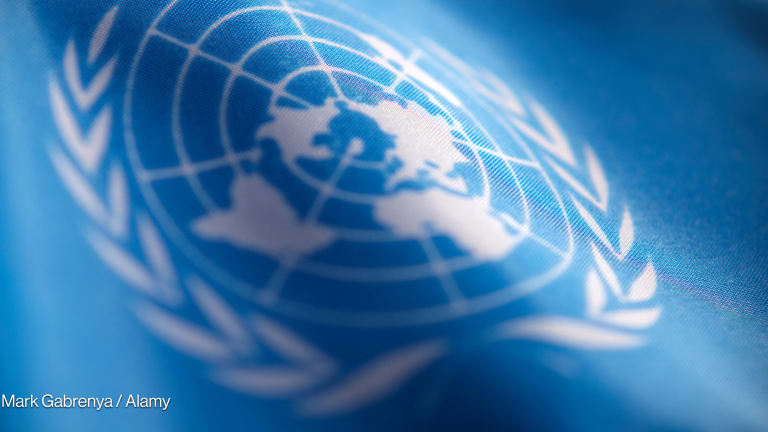
BANGKOK — Women don’t stop giving birth during a disaster, and the United Nations Population Fund’s expertise in crisis contexts has only grown over the years, according to the sexual and reproductive health agency. Now, the United Nations group is strengthening its global humanitarian division, with a 15-member office opening in Geneva to support its emergency portfolio.
In 2018, UNFPA launched focused efforts to end the unmet need for family planning, preventable maternal deaths, and gender-based violence — all of which soar during armed conflict or natural disaster. But it was in 2004 that the agency first began to establish itself as a player in humanitarian response, according to Henia Dakkak, a senior technical specialist who has provided advice to UNFPA country offices facing emergency for nearly 15 years.
Following the deadly Indian Ocean tsunami, Dakkak was deployed to Indonesia as a first responder in the hardest-hit city of Banda Aceh. She had been recruited to UNFPA for her humanitarian experience, and immediately began devising what the agency now refers to globally as dignity kits.
“Women [in Banda Aceh] who wanted to access services were not able because some of them didn't have headscarves, some didn’t even have shoes so that they could stand in line, some of them had their periods … there were a lot of challenges that women were facing that were not obvious for the humanitarian responders — who were mostly males coming from different parts of the world.”
Dignity kits for women — which often include sanitary napkins, soap, underwear, and other essentials — have become a pillar of UNFPA’s response. Now, a new office in Geneva will oversee their delivery as well as enable the agency to bring all the pieces of its humanitarian operations together, Dakkak said.
A 15-member humanitarian response division to support country operations will be housed in the Swiss city, close to offices of partner agencies such as The U.N. Refugee Agency, World Health Organization, International Committee of the Red Cross, and U.N. Office for the Coordination of Humanitarian Affairs. Support with fundraising and advocacy will largely remain in New York, where global operations have until now, been based, Dakkak said, and the changes won’t necessarily result in an increased number of full-time staff on top of the approximately 100 people globally who already support the agency’s humanitarian work.
UNFPA’s 2017 humanitarian response received $215 million, 51 percent of its $424 million appeal. In January, the agency appealed for $463 million to provide life-saving services to about 30 million women of childbearing age, including over 4 million pregnant women affected by humanitarian crises in Afghanistan, Bangladesh, Central African Republic, Iraq, Nigeria, Somalia, South Sudan, and Syria. The work is approximately 50 percent funded, Dakkak said, but she considers the agile way UNFPA manages its internal resources to be its biggest strength.
The agency currently offers approximately $7 million per year in emergency funding to support any country office in crisis and counts $10 million in prepositioned emergency sexual and reproductive health supplies, a program that supports 46 countries.
“All of this puts us in the range of about $20 million on a yearly basis, capable internally of helping really kickstart humanitarian work without waiting for a donor to come forward and give you funding,” Dakkak said.
Each country office has one point person for humanitarian response, and the agency has “invested a lot” in humanitarian preparedness and readiness plans at the local level, Dakkak said. A fast-track procedure triggered by an emergency or crisis allows a country office to hire quickly, and UNFPA is building out its surge capacity roster with specialists in areas such as logistics, gender-based violence, and humanitarian coordination on standby who can deploy quickly.
Already, the agency counts on the additional human resources of several partners who allocate staff from their organizations following emergencies to provide dedicated humanitarian support to UNFPA. The changes to support its increasing humanitarian work are ongoing, Dakkak said, but “I think still we need to grow,” she added.








